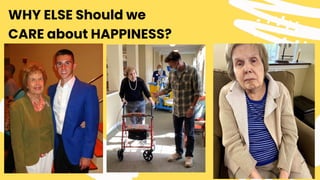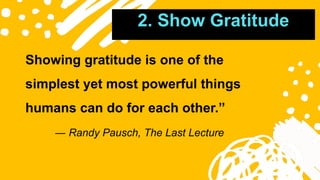The Science of Happiness and Link to Preventing Dementia
- 1. PRESENTED BY DIANA GARDNER The Science of HAPPINESS+
- 2. I won the Lottery! sort of....
- 3. I II won a National Smile Makeover Contest for MHS Grad, Haley Jordan. For 18 months, he flew Haley to NYC to give her a new smile.
- 4. Dr. Daniel invited me to NYC to surprise Haley for her final visit.
- 5. After flying in from LA, seeing her teeth without braces for the first time...
- 6. When Haley saw Riley and I were there from Indiana, she fell on the floor:)
- 10. The Fitness Marshall recently named Number 1 Glamour Magazine
- 11. True Story
- 12. Doing her own thing...new Ulta Collective representative
- 14. I did some RESEARCH… What is behind a smile?
- 15. There is a SCIENCE to Happiness & Positive Psychology
- 16. Course at Yale most popular course EVER You can take it for free. Link is in the Livebinder!
- 17. WHY should We Care about HAPPINESS? Business Wire says, “By 2030, depression and mental health problems will be among the most widespread and costly diseases in the developed world. Promoting resilience can prevent depression, anxiety and behavior problems in young people.”
- 18. WHY ELSE Should we CARE about HAPPINESS?
- 19. WHY ELSE Should we CARE about HAPPINESS? Link to Mom talking about dad... Link trying to get Mom to sing... Because many of the strategies to boost happiness also are linked to preventing dementia!
- 21. What IS Happiness? Psychologist Tal Ben-Shahar, defines happiness as “the overall experience of pleasure and meaning.” Neither “pleasure” nor “meaning” alone quite describe happiness. You need meaning to give you a sense of purpose in life, and you need pleasure to give you a sense of joy or well-being in the present moment.
- 22. What it is NOT... People think it is a string of moments of enthusiasm - it is not that, not short-lived emotions… Happinessisaquality of living
- 23. OVERVIEW • Good NEWS: We can AFFECT our HAPPINESS • Tie-in to Preventing Dementia • KEY STRATEGIES to increase Happiness in Your Own Life!
- 24. Good News! You CAN affect your Happiness!
- 25. GOOD NEWS!!!! Our level of happiness is shaped by the choices we make. If you’ve been chasing wealth, fame, good looks, material things, and power, you may be looking for happiness in all the wrong places.
- 26. Remember... Our INTENTIONAL activities have FOUR TIMES the effect on our HAPPINESS as what happens to us!
- 27. Why ? Research SAYS By studying the personalities of identical twins they've found that about ●50 percent of our happiness -- or unhappiness -- can be traced to our genes. ●40 percent we can control with our daily thoughts and actions ●10 percent is related to our life circumstances, such as where we live, how much money we have, our marital status, or looks
- 28. Think About That! 40 percent of our happiness "is left for the intentional activities that we can choose to engage in -- the things that we do and think every day of our lives.”
- 29. So what DOES Make us Happy? Behaviors that Train Your Brain for happiness
- 30. 1 POWER of a SMILE Smiling adds 7.2 Years to your Life! Baseball Card Experiment
- 31. POWER of a SMILE SMILE - the “Beaming “ smile Players who didn't smile in their pictures lived an average of only 72.9 years, where players with beaming smiles lived an average of almost 80 years.” Is a smile worth seven years extra years of life to you?
- 32. POWER of a SMILE • Smiling stimulates a brain mechanism when we smile that’s better than chocolate! • 1 smile, stimulates level of brain stimulation as 2000 bars of chocolate! • Adds 7 years to your life.
- 33. Smile More... HAPPY PEOPLE DON'T HAVE THE BEST OF EVERYTHING - THEY MAKE THE BEST OF EVERYTHING It's CONTAGIOUS
- 34. Smile More... Research links smiling to a variety of positive outcomes including… • Lower levels of stress hormones like cortisol, adrenaline, and dopamine • Increased levels of endorphins and other mood-enhancing hormones • Normalized blood pressure
- 35. Take a Selfie! Researchers from the University of California, Irvine studied college students and found that snapping selfies and sharing images with friends had a positive effect on their psychological and emotional states. The results were published in the journal Psychology of Well-Being. PRACTICE TIP
- 36. 2. Show Gratitude Showing gratitude is one of the simplest yet most powerful things humans can do for each other.” ― Randy Pausch, The Last Lecture
- 37. Show Gratitude Along with smiling, research shows that gratitude is good for our health, affecting mood and well-being. Practicing Gratitude literally re-wires our brains. When we notice kindness and other gifts we’ve benefited from, our brains become wired to seek out the positives in any situation, even dire ones. As a result, we’re better at bouncing back from loss and trauma.
- 38. The Thank You Note Writing a thank you note lights up your brain. Do you have any thank you notes that are so special you keep them? GRATITUDE - PRACTICE IT!
- 39. Write it Down (be positive) Research shows if you actually list one thing you are grateful for every night for three weeks, the chemistry of your brain literally changes to a ‘happier’ state equivalent to taking an antidepressant.
- 40. Throwback Thursday is good for you! Researchers have found that the act of reminiscing is actually a technique that many people use to make themselves feel better; reminiscing can also calm you down in stressful situations (Speer & Delgado, 2017). While the idea that thinking about positive memories can improve mood and resilience to stress is not a new finding, it is affirming to know that “simply recalling happy memories can combat acute stress at a physical level” (Young, 2017)
- 42. Best Surprise Ever Favorite TBT:) Make a pile of favorite pics to make you smile and recall good memories, or put up a photo album online so you can always know where to find memories that will boost your mood. Riley surprises us with a visit home from LA
- 43. 3 BE POSITIVE (CNN) Are you a pessimist by nature, a "glass half empty" sort of person? That's NOT good for your brain. A new study found that repetitive negative thinking in later life was linked to cognitive decline and greater deposits of two harmful proteins responsible for Alzheimer's disease. "We propose that repetitive negative thinking may be a new risk factor for dementia," said lead author Dr. Natalie Marchant, a psychologist and senior research fellow in the department of mental health at University College London, in a statement.
- 44. Decide if you’re Tigger or Eeyore
- 45. AWESOME THINGS Science says just THINKING about AWESOME things will boost your mood. Making a habit of this will increase your happiness! See this Ted Talk for inspiration! Neil Pasricha’s 3 A’s of Awesome.
- 46. One of MHS’s Happiness Walls
- 47. In contrast... Watching too much news...Negative news can also affect mood and lead to feelings of hopelessness, anger, and fear. One study, for instance, found that people showed an increase in both anxious and sad moods after only 14 minutes of watching TV news. These negative stories can also exacerbate worries about our own personal lives even if they aren’t directly related to the content of the news story.
- 48. In contrast...I had to stop watching LA news during the riots. I was so worried seeing my son on the news - no words to describe it. My anxiety was with me all the time.
- 49. 4 Health & Exercise EXERCISE CHANGES THE BRAIN The research is in and there are many positive brain benefits to which exercise leads. According to John Ratey, Harvard Medical School psychiatrist, “Exercise is the single best thing you can do for your brain in terms of mood, memory, and learning.” Doctors recommend 30 minutes of brisk activity daily, or 150 minutes per week.
- 50. 4 Health & Exercise Grow new Brain Cells! Doctors recommend 30 minutes of brisk activity daily, or 150 minutes per week. New York University neuroscientist Wendy Suzuki says that we can decrease our dementia risk by 30 percent just by walking and that exercise has been shown to improve cognition among those who have already received a dementia diagnosis. ● Suzuki says you can “re-sculpt” your brain with exercise, allowing it to grow new brain cells in the hippocampus and improving memory
- 51. MOVE More... BOOSTS MOOD Just 7 minutes! Take 3 Walks a Week!
- 53. Health & Exercise Diet Matters
- 54. Diet to Prevent Dementia Intermittent Fasting- 5:2 Diet reverses cognitive decline (Gabby Sell, former student getting her Doctorate in neuroscience Iat John Hopkins ) saw great gains with this approach
- 55. Exercise Your Brain! LEnjoy strategy games, puzzles, and riddles. Brain teasers and strategy games provide a great mental workout and build your capacity to form and retain cognitive associations. Do a crossword puzzle, play board games, cards, or word and number games such as Scrabble or Sudoku. ● Purchase some new puzzles and always have one going in a corner of a room. Working a puzzle hits all kinds of happiness factors, esp,. If you do it with someone else. As you work, you are giving your brain some mental aerobics and it’s easy to make a social connection, a huge component of happiness…
- 57. READ (exercise your brain) “I like to eat, play, and watch TV, and I am NOT going to learn to read.” 5-yr.-old Riley Reese
- 58. Regular READING (a magic elixir for health) Folks who read at least 30 minutes a week are 20 percent more likely to report greater life satisfaction and 11 percent more likely to feel creative. They're also 28 percent less likely to suffer from depression and 18 percent more likely to report high self-esteem. Even if your worries are just garden variety, reading will probably help. Reading a book was ranked as a more effective cure for anxiety than taking a walk or chatting with a friend, and almost one in five respondents (19 percent) said reading helps them feel less lonely.
- 59. ● Studies done by the Reading Agency in the UK have also found that reading for fun can reduce symptoms of depression and dementia. ● Research on the effects of brain-stimulating activities back up the memory-boosting benefits of reading. One study published in the journal Neurology, found that life-long readers were better protected against Lewy bodies, amyloid burden, and tangles over the 6-year study. Reading into old age also reduced memory decline by more than 30 percent, compared to other forms of mental activity. READ (exercise your brain)
- 60. 5 GIVING & Generosity Be a GIVER: Invest your own resources to serve - buy experiences not things... 5 Giving and Generosity
- 61. Comedian Steven Wright once said, “You can’t have everything. Where would you put it?” Practice Strategies & Tips
- 62. Do you have a garage, an attic, a spare bedroom (or all 3 of these things) filled with ‘stuff?’ If you don’t, you probably know someone who does. There’s science behind why we have so many ‘things’ or objects that aren’t being used. After 20 years of research, Dr. Tom Gilovich has come to the conclusion that experiences provide greater joy than things, explaining that “One of the enemies of happiness is adaptation. New things are exciting to us at first, but then we adapt to them.” In fact, there is even a word for this: Your Word for the Day:) Stuffocation. a feeling of stress caused by having so many things that you do not know how to use or store them all. word for the day: stuffocation
- 64. You can't put a price on a memory... Practice Strategies & Tips
- 65. ● experiences produce joy during the anticipation of the experience, the actual experience itself, and then from the memories afterwards. ● Experiences tend to bring us together with other people, and social connection is a major key to happiness. Buy Experiences
- 66. So Far... BE INTENTIONAL • Smile • Show Gratitude • Be Positive • Exercise • Be a Giver
- 67. 6 Stay SOCIAL
- 68. SOCIAL See old friends! (my kids met their former babysitter for lunch this summer)
- 69. 6 (Pursue Fun)
- 70. 6 Stay SOCIAL Good Genes are Nice but JOY is better - 80 year study- community lengthens life Close relationships, more than money or fame, are what keep people happy throughout their lives, the study revealed. Those ties protect people from life’s discontents, help to delay mental and physical decline, and are better predictors of long and happy lives than social class, IQ, or even genes. That finding proved true across the board among both the Harvard men and the inner-city participants.
- 71. Psychologists at Harvard University found that people spend about 47% of their waking hours thinking about something other than what they are doing. They also found that this mind-wandering makes people unhappy. • Being mindful helps avoid mistakes and accidents, reduce stress and increase happiness. 7 BE PRESENT - MINDFULNESS
- 72. Life is happening in front of you every day; if you don’t pay attention you can miss a wonderful opportunity to connect. Powering down and disconnecting from the devices we’ve become so dependent on means less fragmented moments throughout the day. Your attention span will increase, your self-awareness and mindfulness will grow, and you’ll be able to appreciate and savor your time and the people you encounter throughout the day. 7 BE PRESENT - UNPLUG
- 73. 8 Self Acceptance Mark Williamson, Director of Action for Happiness, said: "Our society puts huge pressure on us to be successful and to constantly compare ourselves with others. This causes a great deal of unhappiness and anxiety. These findings remind us that if we can learn to be more accepting of ourselves as we really are, we're likely to be much happier. The results also confirm us that our day-to-day habits have a much bigger impact on our happiness than we might imagine."
- 74. 9 Find Purpose "Living with purpose gives you a recurring touchstone or goal, which leads to feeling less anxious about your direction in life. That underlying calm about your life can pay big health dividends. Plus, get this. Being more calm about your life direction and purpose typically leads to being more organized!
- 75. HAPPY BRAIN, HAPPY YOU! BY TRAINING OUR BRAIN TO THINK IN A MORE POSITIVE, MORE OPTIMISTIC WAY- WE CAN TRAIN IT FOR HAPPINESS, IMPROVING OUR SENSE OF WELL-BEING AND ALLOWING OUR BRAIN TO FUNCTION AT PEAK CAPACITY. Wrap it Up
- 76. WRAP it UP...Our level of happiness is shaped by the choices we make. Enduring happiness comes from ...sharing experiences and making memories with others. Some of these practices may help prevent dementia and preserve your brain health!
- 77. And Finally - September 20,2021 A GOOD LIFE IS A COLLECTION OF HAPPY MEMORIES. Dennis Waitley Seems like a good day to make some!












































































